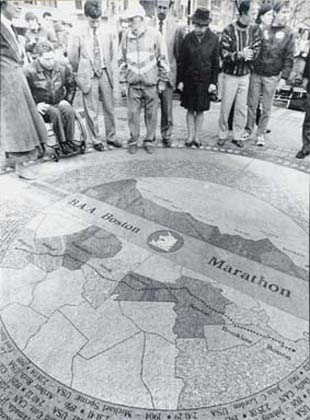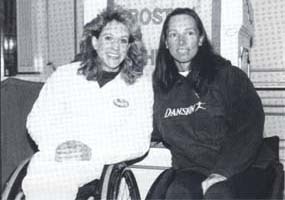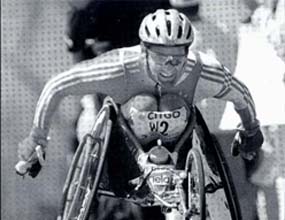By Joseph H. Huber
Boston: The 100th Marathon and The Wheelchair Athlete
Once a year on Patriots' Day, the amateur athlete, weekend warrior, and
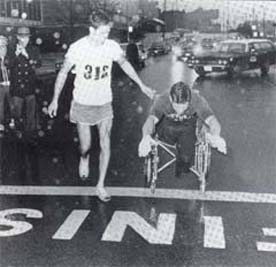
|
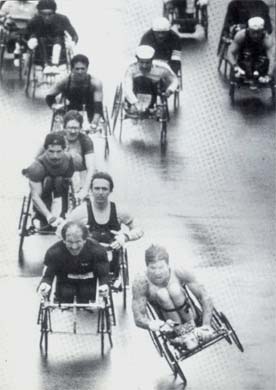
Top, Eugene Roberts, the first unofficial wheelchair athlete crossing
the finish line with his brother, Jim, on April 20, 1970.
Photo by Bill Brett, The Boston Globe.
The start of the major accident that occured in
1987 at the bottom of the first hill in Hopkinton.
Photo by Stan Grossfield, The Boston Globe. |
|
|
|
LIST OF CHAMPIONS BY YEAR
MEN'S WHEELCHAIR DIVISION, 1970-1996
| Time |
Name |
Home |
Time |
| 1970 |
Eugene Roberts |
Baltimore, MD (unofficial) |
7:07:00 |
| 1975 |
Robert Hall |
Belmont, MA |
2:58:00 |
| 1976 |
No Contestants |
|
|
| 1977 |
Robert Hall |
Belmont, MA |
2:40:10+ |
| 1978 |
George Murray |
Tampa, FL |
2:26:57 |
| 1979 |
Kenneth Archer |
Akron, OH |
2:38:59 |
| 1980 |
Curt Brinkman |
Orem, UT |
1:55:00+ |
| 1981 |
Jim Martinson |
Puyallup, WA |
2:00:41 |
| 1982 |
Jim Knaub |
Long Beach, CA |
1:51:31+ |
| 1983 |
Jim Knaub |
Long Beach, CA |
1:47:10+ |
| 1984 |
Andre Viger |
Quebec, Canada |
2:05:20 |
| 1985 |
George Murray |
Tampa, FL |
1:45:34+ |
| 1986 |
Andre Viger |
Quebec, Canada |
1:43:25+ |
| 1987 |
Andre Viger |
Quebec, Canada |
1:55:42 |
| 1988 |
Mustapha Badid |
Pontoise, France |
1:43:19+ |
| 1989 |
Phillippe Couprie |
Pontoise, France |
1:36:04+ |
| 1990 |
Mustapha Badid |
St. Denis, France |
1:29:53+ |
| 1991 |
Jim Knaub |
Long Beach, CA |
1:30:44 |
| 1992 |
Jim Knaub |
Long Beach, CA |
1:26:28+ |
| 1993 |
Jim Knaub |
Long Beach, CA |
1:22:17+ |
| 1994 |
Heinz Frei |
Etziken, Switzerland |
1:21:23+ |
| 1995 |
Franz Nietlispach |
Rheinfelden, Switzerland |
1:25:59 |
| 1996 |
Heinz Frei |
Etziken, Switzerland |
1:30:14 |
| |
(R) |
| + = World Best |
Boston Marathon |
1996 |
|
WOMEN'S WHEELCHAIR DIVISION, 1970-1996
| Time |
Name |
Home |
Time |
| 1977 |
Sharon Rahn |
Champaign, IL |
3:48:51 |
| 1978 |
Susan Shapiro |
Berkeley, CA |
3:52:35 |
| 1979 |
Sheryl Bair |
Sacramento, CA |
3:27:56+ |
| 1980 |
Sharon Limpert |
Minneapolis, MN |
2:49:04 |
| 1981 |
Candace Cable |
Las Vegas, NV |
2:38:41 |
| 1982 |
Candace Cable-Brookes |
Las Vegas NV |
2:12:43+ |
| 1983 |
Sherry Ramsey |
Arvada, CO |
2:27:07 |
| 1984 |
Sherry Ramsey |
Arvada, CO |
2:56:51 |
| 1985 |
Candace Cable-Brookes |
Long Beach, CA |
2:05:26+ |
| 1986 |
Candace Cable-Brookes |
Long Beach, CA |
2:09:28 |
| 1987 |
Candace Cable-Brookes |
Long Beach, CA |
2:19:55 |
| 1988 |
Candace Cable-Brookes |
Long Beach, CA |
2:10:44 |
| 1989 |
Connie Hansen |
Denmark |
1:50:06+ |
| 1990 |
Jean Driscoll |
Champaign, IL |
1:43:17+ |
| 1991 |
Jean Driscoll |
Champaign, IL |
1:42:42+ |
| 1992 |
Jean Driscoll |
Champaign, IL |
1:36:52+ |
| 1993 |
Jean Driscoll |
Champaign, IL |
1:34:50+ |
| 1994 |
Jean Driscoll |
Champaign, IL |
1:34:22+ |
| 1995 |
Jean Driscoll |
Champaign, IL |
1:40:42 |
| 1996 |
Jean Driscoll |
Champaign, IL |
1:52:56 |
| |
(R) |
| + = World Best |
Boston Marathon |
1996 |
|
|
|
recreational runner, share a bit of the glory and a lot of the road with the
world's top competitors (The Boston Herald, April 15, 1996). In a typical
year 9,500 runners qualify for Boston. This year there were 38,706 registered
runners and 2,000 bandits (unofficial runners), making the 100th Boston
Marathon the world's largest marathon in history.
Throughout the 100-year long period that encompasses the Boston Marathon (the
world's oldest continuous annual marathon), the historic race has served as
a proving ground for the young and old, as well as men and women. The 26-mile
385-yard course which starts on Main Street in the rural New England town of
Hopkinton and ends on Boylston Street in downtown Boston, has arguably provided
the standard by which all other marathon performances are measured.
A standard of a different sort-but certainly just as important-was established
on April 20, 1970, when Vietnam veteran Eugene Roberts* of Baltimore, who lost
his legs to a landmine, became the first (unofficial) wheelchair athlete to
complete the Boston Marathon. Almost an hour before noon (the starting time
for the Marathon) Roberts began pushing his wheelchair toward Boston on a cold
and rainy day. He finished the course in just over seven hours using a hospital-issued
wheelchair (The Boston Globe, April 21, 1970). Roberts' achievement
is comparable to that of Roberta Gibb* who was the first woman to run (unofficially)
the Boston Marathon officially in 1966.
Five years later (1975), 24-year-old Bob Hall of Belmont, Massachusetts, became
the first sanctioned wheelchair entrant finishing with a time of 2:58. Thus,
the Boston Marathon became the world's first major marathon to permit wheelchair
racers to compete. Not since the admission of women as official entrants in
1972 had the Boston Marathon experienced such a significant change.
In 1977 Hall smashed his course record to win with a time of 2:40: 10. This
was also the year the Boston Athletic Association (BAA), the organization that
sponsors the marathon, started the tradition of having the wheelchair athletes
start 15 minutes (11 : 45am) ahead of the non-disabled runners, thus avoiding
the crowded start and possible injuries to non-disabled runners. Hall did not
run the l00th Boston; however, last year he recorded a personal best of 1:47:41
on the 20th anniversary of his historic breakthrough. Hall has worked for over
20 years as a political activist for wheelchair athletics and currently serves
as the coordinator of the wheelchair division for the BAA.
Also in 1977, Sharon Rahn of Champaign, Ilinois, became the first woman to
complete the course in a wheelchair. She finished fifth in 3:48:51 over a field
of six men.
In the following year the wheelchair field expanded to include 18 men and
two women. George Murray of Tampa. Florida, broke Hall's 1977 record by 13:13.
The 1980 Boston Marathon reached a significant turning point. Curt Brinkman
of Orem, Utah, became the first male to break two hours (1:55:00) and the first
wheelchair athlete ever to outpace nondisabled runners by beating Bill Rogers
(2:12:11). The same year Sharon Limpert of Minneapolis, Minnesota, became the
first woman to break three hours at Boston (2:49:04).
The 1980s
During the 1980s wheelchair athletes established themselves as an important
part of the Boston Marathon tradition. Several records and events have focused
world-wide attention on the wheelchair division, especially:
- With the advent of lightweight, high-tech, three-wheeled chairs, engineered
specifically for athletes' individual needs, wheelchair competitors in the
1980s moved at a pace so fast that most non-disabled runners were unable
to catch up to them.
- In 1984, the BAA sanctioned the wheelchair division. From that year, the
BAA presented awards to all division winners: men and women open, men and
women masters (40+), men and women seniors (60+), and men and women wheelchair
division.
- The 1984 race also marked the first year of a foreign champion-Andre Viger
of Quebec, Canada. Viger's win led to foreign domination of the race for
the rest of the decade.
- The BAA, backed by John Hancock Financial Services, presented the first
ever monetary awards to all division winners in 1986. Andre Viger collected
a total of $10,000 ($2,500 for first place, $7,500 as a world record bonus)
and Candace Brooks of Long Beach, California, received $2,500 for her first
place finish. (The 1996 prize structure awarded $12,000 each to the winners
of the men's and women's wheelchair division).
- Wheelchairs can reach speeds of 30-40 mph at the start of a downhill race.
In 1987 the wheelchairs started aggressively on wet, steep pavement. At the
bottom of the first hill nine athletes fell to the pavement after either
hitting another wheelchair or losing their balance. A controlled start for
the first mile was instituted to prevent crashes in subsequent years.
Past and Present Champions
Over the 100 years of marathon history there are so many stories to tell,
but the living legends of the wheelchair division over the past 21 years are
Cable, Knaub, and Driscoll. Combined, they have won 17 times while setting
11 world records. All three participated in Boston's centennial marathon. Their
names and accomplishments command respect.
Candace Cable, 41, of Truckee, California, dominated Boston throughout the
'80s with six victories, including four in a row from 1985-88. She has the
distinction of having won every Boston Marathon in which she competed except
for 1996. Cable came out of retirement for the sheer honor and privilege of
competing in the centennial marathon. During the 1987 marathon to avoid hitting
another wheelchair during a chain reaction spill, Cable lost a tire off the
right rim of her wheelchair. She used a CO2 cartridge and a bicycle pump to
inflate a spare tire to get back in the race. Cable took the lead again eight
miles into the race and went on to win the women's wheelchair division (Sports
'N Spokes, September/ October 1987).
Jim Knaub, 40, of Long Beach, California, has won Boston a record five times
since 1982. He won three consecutive races from 1991-93, setting a course record
each time. Knaub's Boston Marathon odyssey includes the closest ever wheelchair
finish. In 1982, Knaub won (1:51:31) by a mere two seconds over George Murray.
Knaub went out a little too fast in 1987 and was involved in the chain reaction
spill at the bottom of the first hill. He had to drop out of the marathon after
12 miles. Throughout his career, Knaub has won a total of 28 marathons.
Jean Driscoll, 29, of Champaign, Illinois, became the first wheelchair athlete
to win the Boston Marathon seven times. Her time of 1:52:56 was 18:34 off her
world best of 1:34:22 set at Boston in 1994. Louise Sauvage of Australia was
second in 1:54:39, followed by Deanna Sodoma of Carlsbad, California (1 :56:
17), and Candace Cable (1 :56: 18).
WOMEN'S WHEELCHAIR DIVISION, 1975-1996
| Rank |
Time |
Name |
Home |
Date |
| 1 |
1:34:22 |
Jean Driscoll |
Illinois |
18 APR 1994 |
| 2 |
1:34:45 |
Louise Sauvage |
Australia |
18 APR 1994 |
| 3 |
1:34:50 |
Jean Driscoll |
Illinois |
19 APR 1993 |
| 4 |
1:35:42 |
Connie Hansen |
Denmark |
19 APR 1993 |
| 5 |
1:36:52 |
Jean Driscoll |
Illinois |
20 APR 1992 |
| 6 |
1:39:31 |
Louise Sauvage |
Australia |
19 APR 1993 |
| 7 |
1:40:16 |
Connie Hansen |
Denmark |
20 APR 1992 |
| 8 |
1:40:42 |
Jean Driscoll |
Illinois |
17 APR 1995 |
| 9 |
1:42:08 |
Ann Cody-Morris |
New Mexico |
20 APR 1992 |
| 10 |
1:42:42 |
Jean Driscoll |
Illinois |
15 APR 1991 |
|
|
BEST OF ALL-TIME TOP 10 PERFORMANCES
MEN'S WHEELCHAIR DIVISION, 1975-1996
| Rank |
Time |
Name |
Home |
Date |
| 1 |
1:21:23 |
Heinz Frei |
Switzerland |
18 APR 1994 |
| 2 |
1:22:17 |
Jim Knaub |
California |
19 APR 1993 |
| 3 |
1:22:52 |
Thomas Sellers |
Florida |
18 APR 1994 |
| 4 |
1:23:33 |
Mustapha Badid |
France |
19 APR 1993 |
| 5 |
1:23:56 |
Andre Viger |
Canada |
19 APR 1993 |
| 6 |
1:25:16 |
Craig Blanchette |
Oregon |
19 APR 1993 |
| 7t |
1:25:18 |
Mustapha Badid |
France |
18 APR 1994 |
| 7t |
1:25:18 |
Jan Mattern |
Texas |
18 APR 1994 |
| 9 |
1:25:39 |
Jan Mattern |
Texas |
19 APR 1993 |
| 10 |
1:25:40 |
James Briggs |
Illinois |
19 APR 1993 |
|
|
This year's victory places Driscoll ahead of Candace Cable for most career
wins in the women's wheelchair division and equals the seven wins by Clarence
DeMar in the men's open division. DeMar won his seventh Boston Marathon at
age 41 in 1930 (2:3:48). DeMar's seven wins occurred over 19 years (1911-1930)
while Driscoll's feat was unprecedented because she accomplished her record
in seven consecutive years (1990-1996). Driscoll's win is even more amazing
because she fractured her leg in a July tubing accident and was unable to get
into her racing chair until November.
At the 1992 Paralympic Games in Barcelona, Driscoll was a part of the USA's
gold medal4xl00 m relay team with Candace Cable, Ann Cody-Morris, and Carol
Hetherington. The Women's Sports Foundation named her the Amateur Sportswoman
of the Year in 1991, making her the first wheelchair athlete to receive this
honor.
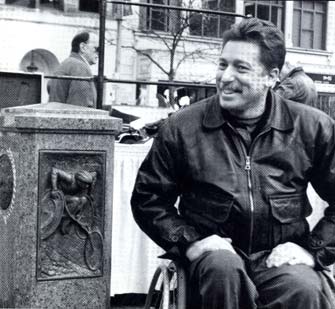
Bob, Hall, the Boston Marathon first sanctioned wheelchair entrant and
current wheelchair division coordinator, next to the granite post
of the wheelchair athlete located at the Boston Marathon's centennial
monument near the finish line. Photo by Joseph Huber, Palaestra.
|
This year, Heinz Frei, a 38-year-old citizen of Etziken, Switzerland, won
the men's wheelchair division for the second time in three years. His time
of 1:30:14 was 8:51 off his world best of 1:21:23 set at Boston in 1994. Philippe
Coupie of Pontoise, France, was second (1:34:00) and Tom Sellers of Ormond
Beach, Florida, was third (1 :35:59).
In preparation for the 100th Boston, Frei relied heavily on cross-country
sledging, an activity that is comparable to cross-country skiing on a snowboard.
In 1994, Frei competed in the Winter Paralympics in Norway and last year placed
second at Boston (1:27:49), before adding victories at both the Berlin Marathon
(1:22:48), a race he has won eight times, and the Oita (Japan) Marathon (1:22:38).
Boston remains the oldest continuous marathon in history and holds the world's
unchallenged standard for excellence, and is most beloved of all road races.
In a lasting tribute to all athletes and champions who have taken part in the
Boston Marathon, a centennial monument was dedicated this year in Copley Square
Park which lies near the finish line. The centerpiece of the granite monument
is a medallion surrounded by four granite posts. The medallion consists of
a sculpted concentric ring. At the sculpted center of the medallion is an elevation
profile of the course and a map arranged in eight colors of granite-each granite
stone representing one of the eight cities and towns along the historic route.
The concentric ring includes the names of all male and female champions, including
the wheelchair division. In addition, one of the four granite posts represents
a figure of a wheelchair athlete in honor of all those who have run Boston
since 1970. Included on the monument is an inscription taken from the last
three lines of Tennyson's classic poem Ulysses:
One equal temper of heroic hearts,
Made weak by time and fate, but strong in will
To strive, to seek, to find, and not to yield.
Selected References
Concannon, J. (1990, April 21). Determined legless Vietnam vet completes Marathon
in wheelchair. The Boston Globe, p. 29.
Huber, J. H., & LaDuke, A. (1987). Marathon mess: Wheelchair athletes overcome
a major mishap that could have become a disaster. Sports 'N Spokes,
13 (September/ October), 36-38.
Running into history. (1996, April 15). The Boston Herald, p. 20.



